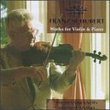| All Artists: Ludwig van Beethoven, Otto Klemperer, New Philharmonia Orchestra, John Alldis Choir, Daniel Barenboim Title: Beethoven: Piano Concertos Nos. 1-5; Choral Fantasia Members Wishing: 0 Total Copies: 0 Label: Angel Records Release Date: 11/5/2002 Genre: Classical Styles: Opera & Classical Vocal, Forms & Genres, Concertos, Historical Periods, Classical (c.1770-1830), Modern, 20th, & 21st Century, Instruments, Keyboard Number of Discs: 2 SwapaCD Credits: 2 UPC: 077776336022 |
Search - Ludwig van Beethoven, Otto Klemperer, New Philharmonia Orchestra :: Beethoven: Piano Concertos Nos. 1-5; Choral Fantasia
 | Ludwig van Beethoven, Otto Klemperer, New Philharmonia Orchestra Beethoven: Piano Concertos Nos. 1-5; Choral Fantasia Genre: Classical
|
Larger Image |
CD DetailsSimilar CDs
|
CD ReviewsAmong the best Beethoven Concertos, and an interesting contr Alan Majeska | Bad Axe, MI, USA | 11/14/2005 (5 out of 5 stars) "Daniel Barenboim's late 1960s recording of the Beethoven Piano Concertos is one of the best, and an interesting contrast: the young, brilliant pianist Barenboim with the elderly condcutor Klemperer. Klemperer was known for slow tempos by the 1960s, and a sense of granitic structure: like viewing a beautiful rock hewn of granite from a distance, but not something you can get close to, nor call "charming" or "loving." This sense is present in Klemperer's orchestral contribution to these recordings: tempos are never too fast, and there is a sense that something timeless and great is going to happen in every movement. Barenboim's pianism seems awesome: flawless and technically perfect, and the Philharmonia Orchestra plays beautifully in each concerto. Recorded sound is very good: analog stereo from the late 1960s. Keep in mind, however, these are not "cold" recordings. The music may be calculated under Klemperer's direction to a certain degree, but everything makes perfect musical sense, and Beethoven's titanic greatness shines throughout. If you like a more lean approach to Beethoven's Concertos, avoid Barenboim/Klemperer. Some listeners may not agree, but I believe Barenboim/Klemperer's Beethoven Concertos to be among the best, along with Ashkenazy/Solti (Decca); Rubinstein/Leinsdorf (RCA/ Boston Symphony); and for a more Classical approach free of Romantic excess, Perahia/Haitink (Sony)." Not just a May-December marriage but a high point for Barenb Santa Fe Listener | Santa Fe, NM USA | 05/17/2006 (5 out of 5 stars) "Listening to these imaginative and ingratiating performances of the five Beethoven piano concertos, I marvelled at Barenboim's early maturity. He displays uncanny poise and confidence, fully equal to Klemperer's grand manner. Sadly, the mid-Sixties was about the last time I could connect with Barenboim, whose romantic tendencies, so impressively applied here, went off into caricature: he began to channel Furtwangler and hasn't stopped, despite the fact that it caused him to lose his best musical instincts. (His cycle of the Beethoven symphonies with the Berliner Staatskapelle is so stody and dull that it might as well join Furtwangler in the grave.) That's irrelevant here. The amazing thing for me is that Barenboim proves so successful at making these overly familiar works sound fresh through pure musical insight of the kind Schnabel might have--every movement really speaks under his hands. As for Klemperer, his is simply the greatest condcuting ever found in a complete Beethoven cycle. I got more feeling from these CDs than from his at times ponderous symphony recordings. For example, in the slow movement of Concerto #2, pianist and conductor agree that the style should be mature Beethoven, with full sonority, measured tempos, and weightiness. That may sound like a bad idea in this Haydnesque early work, but by the time they build to the hushed, mysterious coda, we are transported to an inspired world. Throughout there is the same stamp of genuineness. Barenboim eschews virtuoso gimmicks and never powers his way through the score. I must confess that I waited forty years to buy this set, on the assumption that Klemper would be inattentive and heavy-handed. How very wrong I was. This Beethoven cycle sets the gold standard." Unmissable stuff mozza76@hotmail.com | United Kingdom | 12/14/1999 (5 out of 5 stars) "How lucky we are that Daniel Barenboim began to mature as a great artist with Klemperer enjoying a glorious Indian summer. This is a miraculous recording. The 24-year-old Barenboim is a match for the magisterial Klemperer, who was almost three times the age of his precocious pianist. It's remarkable to find two artists of such different ages cooperating so well. And they're fully equals as well - this is a version of the Beethoven concertos with soloist as primus inter pares (to quote one reviewer). The Emperor has seldom sounded so grand. The orchestral playing is quite something as well."
|

 Track Listings (6) - Disc #1
Track Listings (6) - Disc #1


